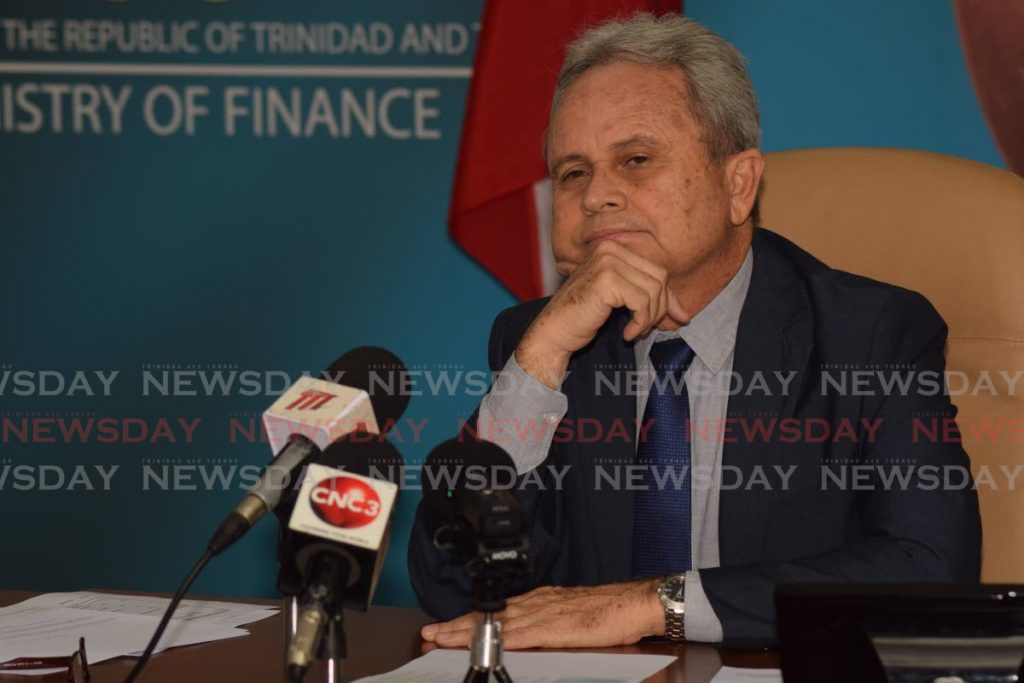Falling oil price not a worry for Imbert

FINANCE MINISTER Colm Imbert announced Tuesday that the country's revenue projections for 2020 have been revised downwards by $3.5 billion, following the international economic fallout from coronavirus and an oil price war between Saudi Arabia and Russia. But, Imbert assured, TT can weather this storm as it has before during other financial crises.
"We have been down this road before and we have come out of it by careful management of the economy. Right now we are formulating strategies on how we deal with this fallout. We have gone this way before and came out successfully," he told the media at a press conference at the Ministry of Finance, Eric Williams Financial Complex, Port of Spain.
Imbert said government had made the decision to revise the budgeted price of oil from US$60 per barrel to US$40 and natural gas from $3 to US$1.80 per mmbtu.
Asked how the government plans to keep the fiscal year’s deficit below $10 billion, given the budgeted shortfall was estimated to be $5 billion, Imbert said once expenditure remains intact, the Government will “have to finance it through three mechanisms”. To cushion the blow, Government will seek to raise revenue through borrowing from both local and regional banks; a possible draw down from the Heritage and Stabilisation Fund (HSF), which is not an immediate reaction given the current structure of the fund; and the sale of State assets.
Imbert also addressed the fall in oil prices in the Senate, following his media conference when the Opposition asked about the impact on the country’s finances and the Government’s plan to avoid an economic crisis. Oil prices, he said had fallen from US$62 per barrel in January to US$33, about half the budgeted price. This was the same thing the country experienced between 2016-2017 with a $20 billion loss in revenue. “So we’ve faced this kind of crisis before and the country has come through it and the country has survived.”
Opposition Senator Wade Mark asked if the now projected $40 a barrel oil price was reasonable, to which Imbert said it was. That figure is “extremely realistic”, Imbert said, noting that in the first four months of the fiscal year the US$62 price was above the budgeted projections for that period, and in February, the fifth month, the price was closer to $54. “An average of $40 is quite reasonable. If it remains at $30 it will average out the year at $40. So we’ve done a lot of homework over the last couple days to come up with the average figures.”
At his media briefing Imbert said revenue from oil and gas had been shifted from taxes on profits to royalties from production in 2017, a move he said helped in bad times such as now because if it had remained as the former, that tax revenue would have been far less.
The projected loss in revenue, Imbert said, will not impact expenditure because any tightening of expenditure could stifle economic activity. Government will not have any knee-jerk reactions, he said. "I can’t get a cutlass and willy-nilly chop the budget.” He said taking from the HSF can’t be done lawfully until October and that was not a short-term solution. He said he would be reviewing this structure that only allows for annual withdrawals while deposits are done quarterly.
Regarding taking a loan to facilitate the shortfall, Imbert said the current debt to gross domestic product (GDP) ratio was approximately 65 per cent and the Government is willing to borrow up to 70 per cent of the GDP. That five per cent wiggle room amounts to roughly $8 billion, which he said can facilitate the shortfall and the existing $5 billion deficit of the budget.
He added that a US$250 million loan that was set to mature later this year will be refinanced and can see the country gaining some "hundred of millions" with a low interest rate. Government officials will go on a roadshow to the US, he said, to negotiate that refinancing and attempt to woo investors. The sale of State assets, although something to consider, is not going to be done now as the Government does not want to "prejudice any future prospects" if a similar situation arise.


Comments
"Falling oil price not a worry for Imbert"